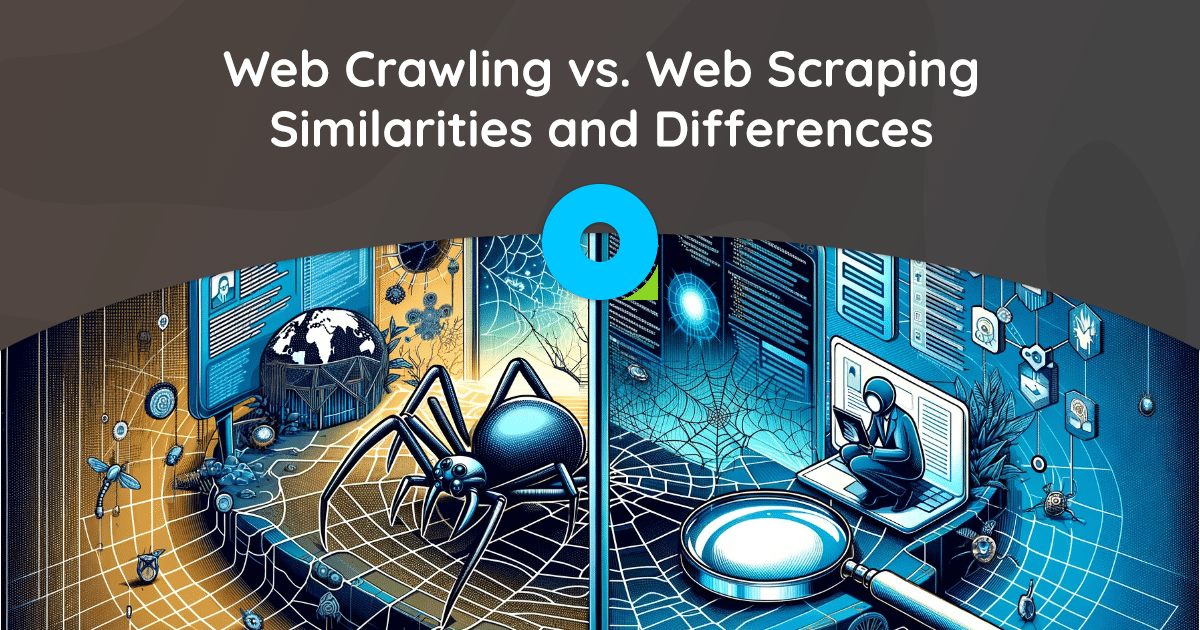
The site is a huge library with important information. It is relevant not only for finding material for reports, but also for making money. That is, for commercial companies. Therefore, parsing remains extremely popular. There are two strategies for collecting data: web crawling and web scraping. Both collect data, but with different approaches. In the article we will look at the features, compare the application and figure out how to choose the appropriate method for specific tasks.
Web Crawling
Web crawling is the process of automatically crawling websites to collect information about pages for indexing by search engines. The main purpose of crawling is to create search indexes that allow you to find the necessary information on the Internet. This process can be large and often involves millions of web pages. Here are some examples of using web crawling:
- Search engines. The primary purpose of search engines such as Google, Bing and Yahoo is to index millions of web pages to provide search results to users.
- Web Archives. Some organizations scan and save copies of web pages to create web archives that can be used for research or to access old information.
- Price and competitiveness analysis. Companies can use web crawling to monitor product prices as well as competitor and market analysis.
- Media monitoring. Media companies and analysts use web crawling to monitor news, discussions and social media in real time.
- Data collection and research. Researchers and analysts can perform web crawling to collect data, analyze trends, and conduct research in various fields.
Web Scraping
Web scraping or scraping, on the other hand, is the process of extracting specific data from websites for analysis, storage or further use. Unlike crawling, which focuses on broad information extraction, scraping focuses on specific data. For example, scraping can be used to extract product prices from online stores, news from media portals, or product data from competitors’ websites.
Similarities
Now that we have outlined the essence of the tools, let’s talk about the similarities:
- Automation. Both processes rely on automated data extraction from websites, saving time and effort.
- Using HTTP. Both crawling and scraping use the HTTP protocol to communicate with web servers and retrieve data.
Now let’s look at the differences.
Differences
- Crawling focuses on indexing websites for search engines, while scraping focuses on extracting specific data for analysis and other purposes.
- Data volume. Crawlers work with large amounts of data and can index millions of web pages, while scraping often works with a limited amount of data.
- Request frequency. Crawling is often performed automatically and can be a continuous process that updates search engine indexes, while scraping can be a one-time operation or performed periodically according to user needs.
Using Proxy Servers
Proxy servers are used for both crawling and parsing. They help you bypass limitations and enable multi-threaded data retrieval. After all, if you parse from one IP, the user will quickly be banned for exceeding the number of requests to the server. Many proxies distribute the load among themselves and do not overload the server. Affordable, high-quality server proxies are quite suitable for parsing and crawling.
Application in Various Industries
Crawling and parsing are used in e-commerce to monitor product prices and analyze competitors. In the financial sector to analyze financial data and investment opportunities. In medicine, to collect data on diseases and research. Almost every industry has a need to collect and analyze data from websites.
Tools for Crawling and Parsing
When working with crawling and scraping, it is important to choose the appropriate tools and libraries. Crawling requires more sophisticated tools that can crawl robots.txt files, manage request queues, and ensure reliability. On the other hand, parsing can be easily organized using simple libraries:
- Scrapy is a powerful and flexible crawling and scraping framework written in Python. It provides many tools to create and customize your own crawlers. Scrapy also supports data processing and exporting to various formats.
- Beautiful Soup is a Python library that makes HTML and XML parsing easier. This is a great choice if you need to extract and manipulate data from web pages. It provides a simple and convenient API for document navigation.
- Apache Nutch is an open source platform for crawling and indexing web content. This tool provides a scalable and extensible approach to crawling. It supports various data formats.
- Selenium is a browser automation tool that can be used for crawling and scraping data from websites where interactivity with the web page is important. It allows you to control the browser and perform actions as if the user were doing them manually.
- Octoparse is a visual data scraping tool for creating parsers without programming. It is useful for those who want to quickly extract data from websites.
- Apify is a platform for website scraping and automation. Provides many ready-made scrapers, as well as the ability to create your own scripts. Apify also offers tools for monitoring and managing scraping tasks.
When scraping, it is important to consider different data processing methods. This includes structuring, cleaning, aggregating, and transforming data into formats that can be analyzed or stored. Structured data makes it easier to further analyze and use.
Crawling and scraping allow you to obtain data from websites. Both tools require the use of a proxy and we suggest renting them from us. You will find server proxies for many countries that are ideal for crawling and scraping.




